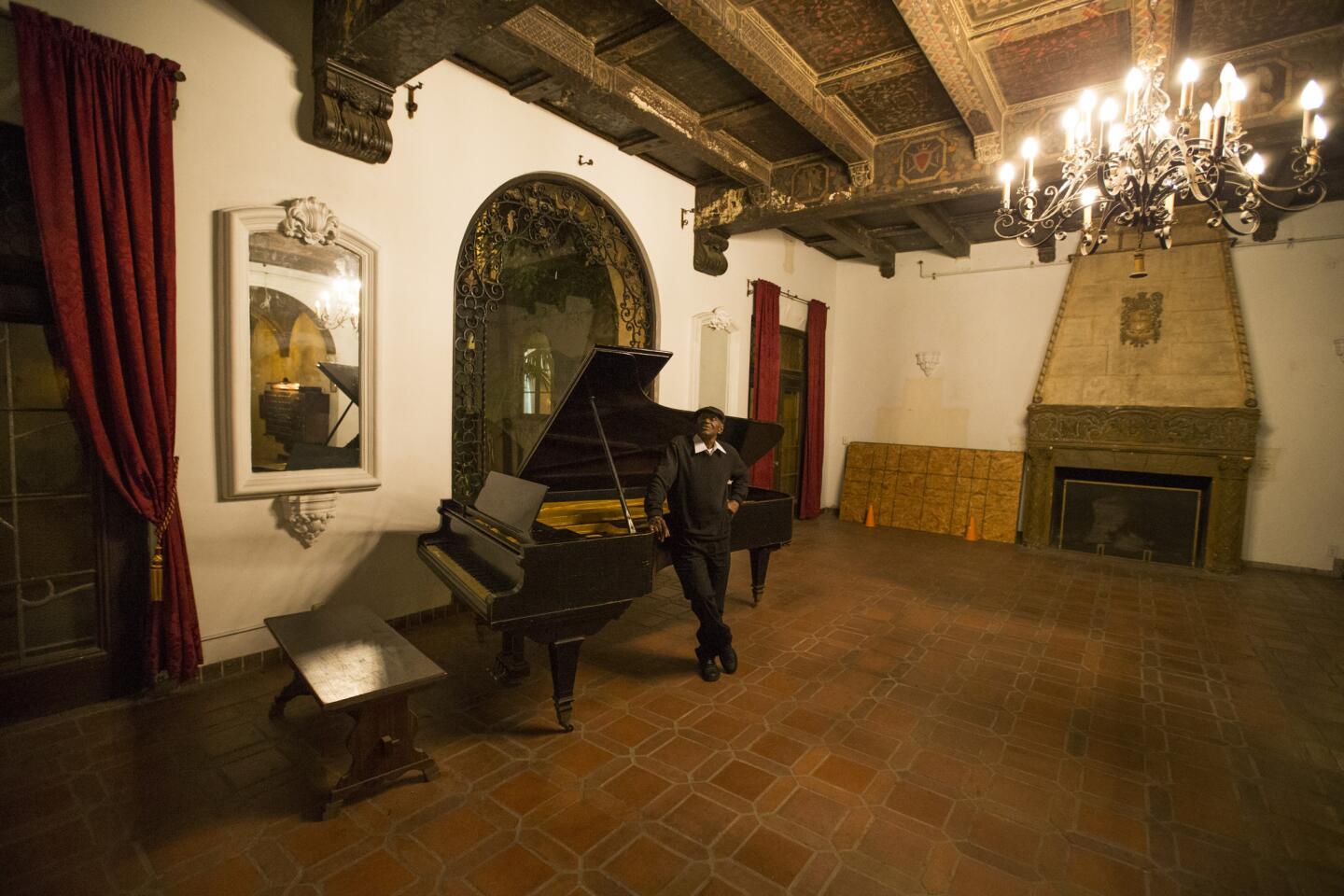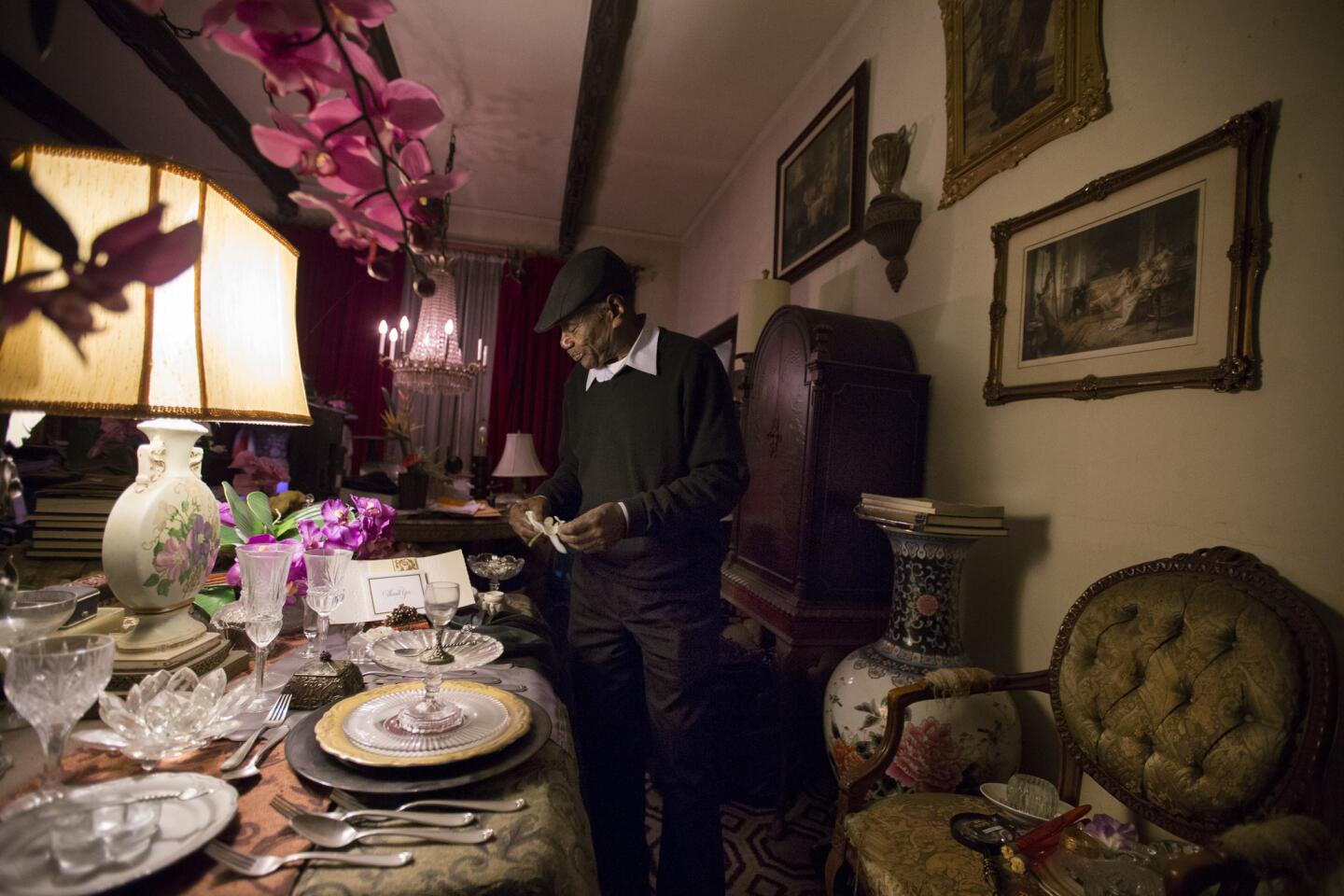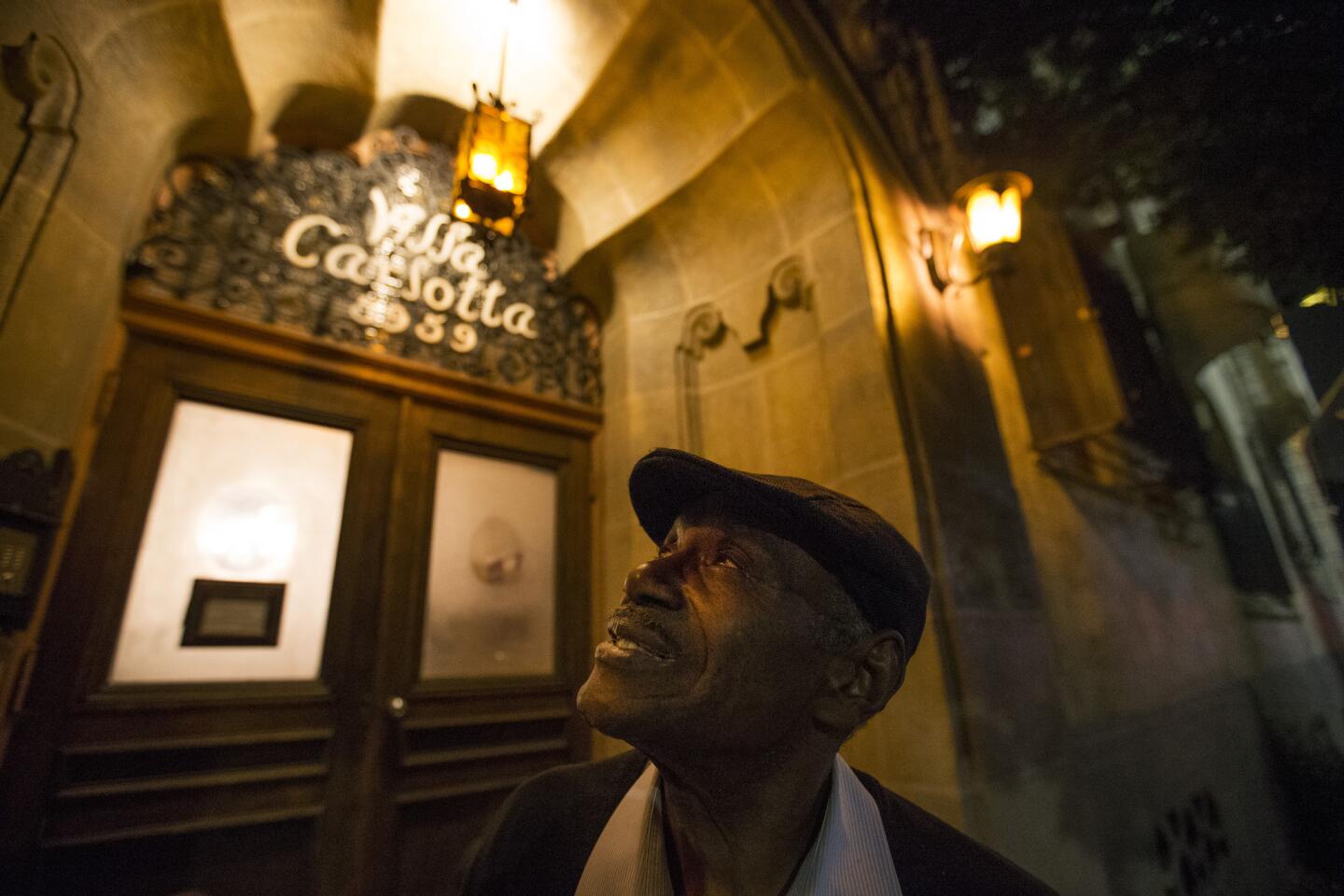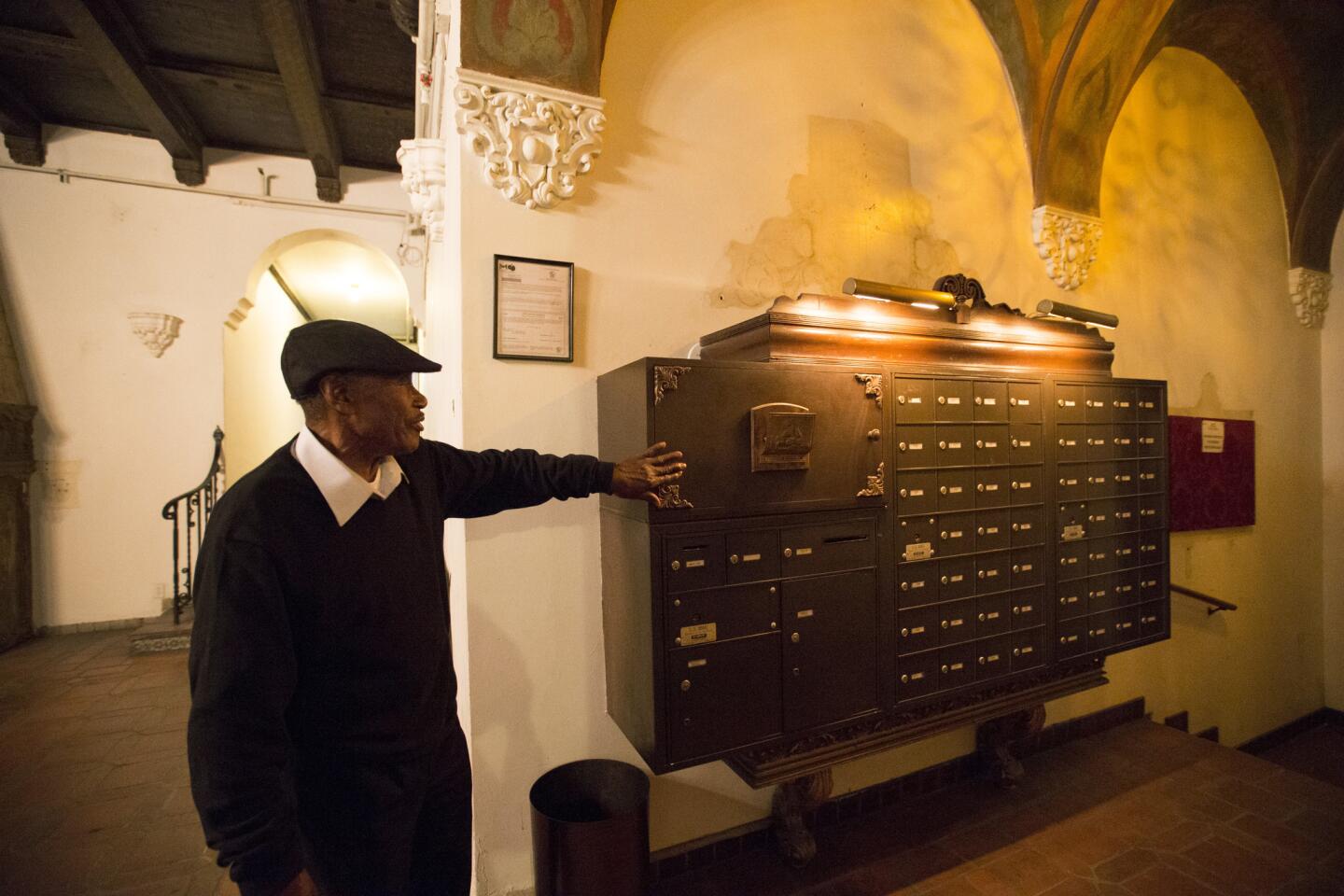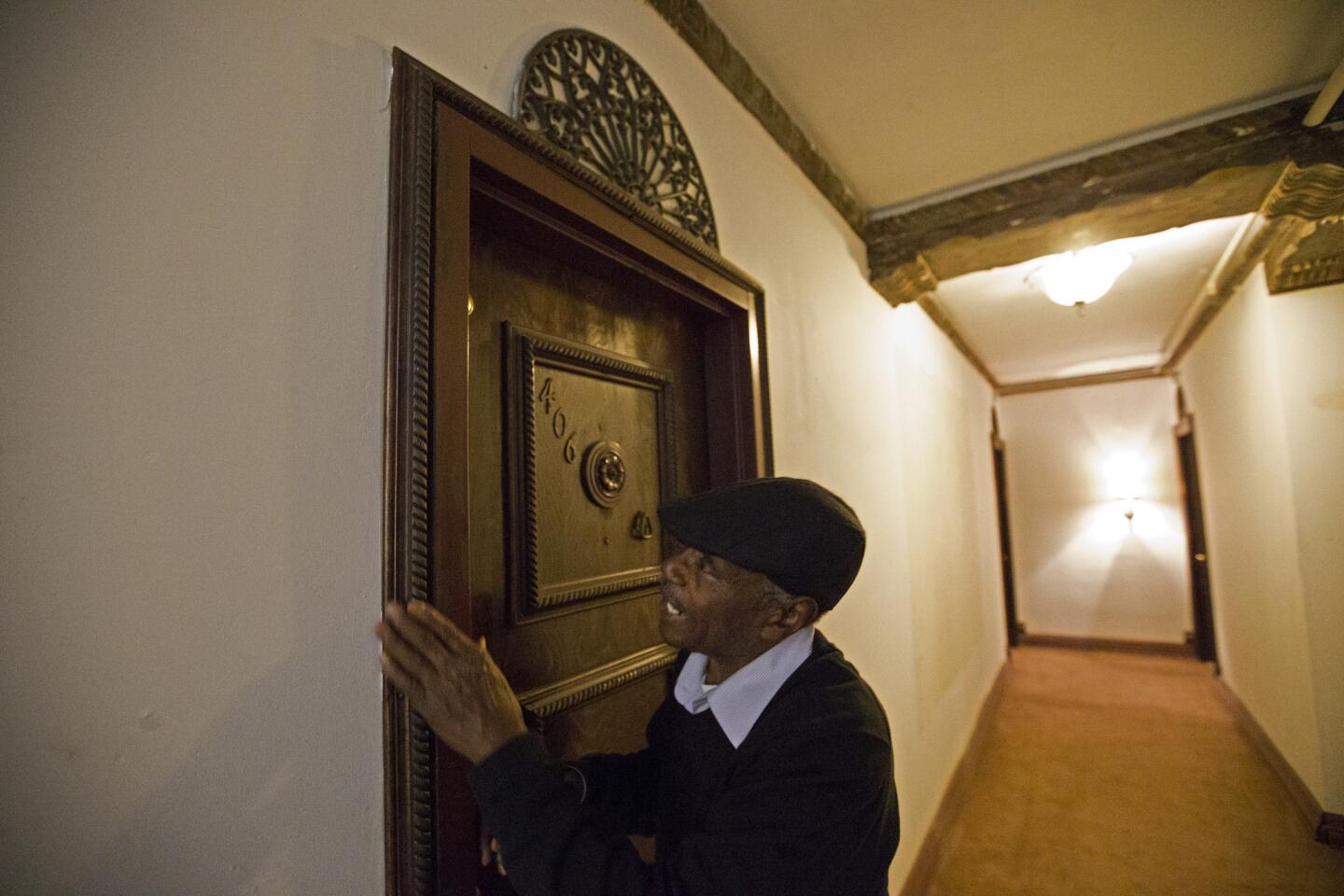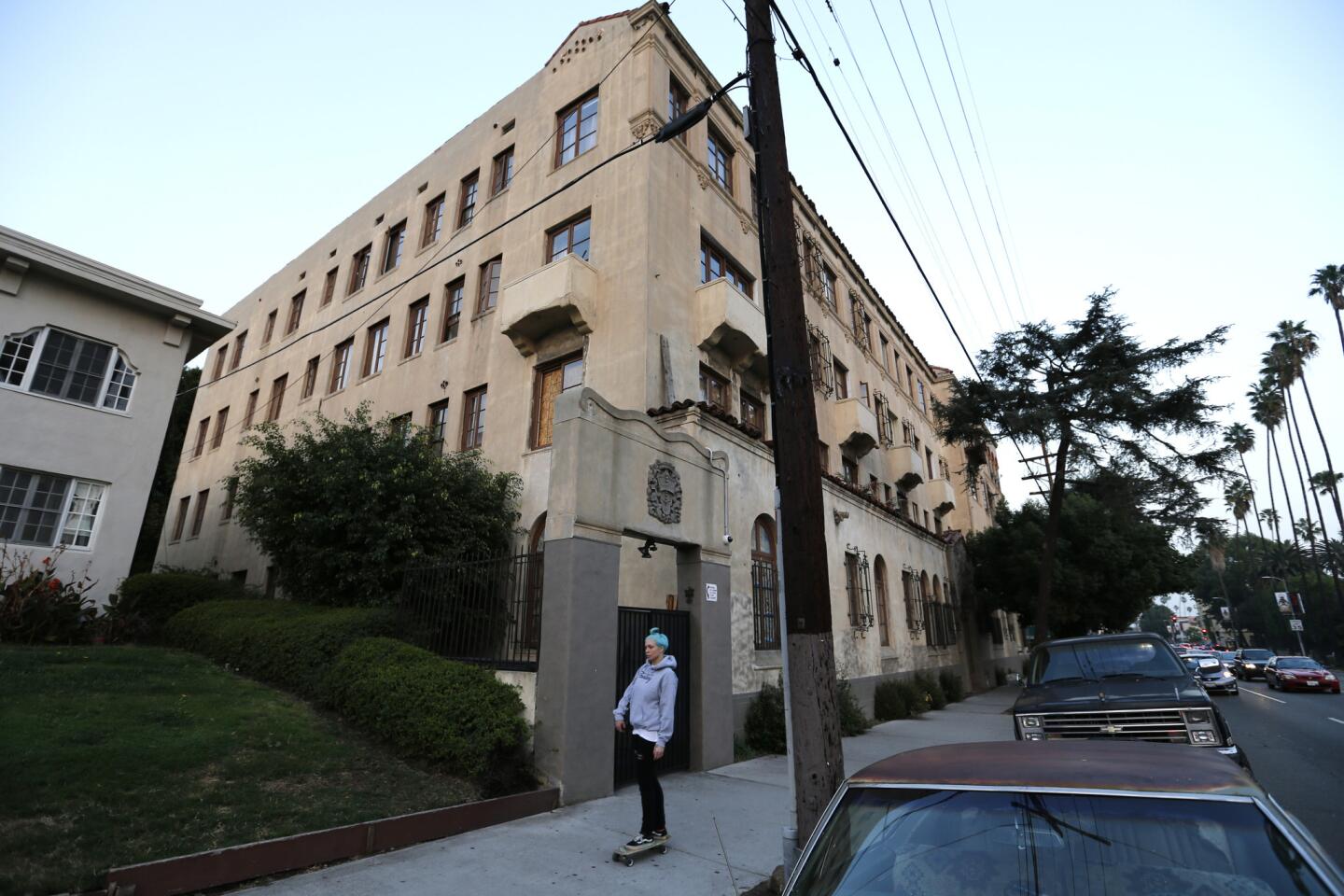Great Read: Changing neighborhood engulfs their Old Hollywood home
- Share via
For nearly 40 years, Sam Fuller has made his home in the Villa Carlotta, a 1920s Hollywood apartment building whose Juliet balconies and wrought-iron grilles conjure the romance of old Italy and Spain.
Louella Parsons got married in the lobby. Adolphe Menjou once roamed the halls. Marion Davies, George Cukor, David O. Selznick and Edward G. Robinson slept under the terra cotta-tiled roof.
Time and neglect had left the Villa Carlotta crumbling in places — chipped tile here, scuffed wood there, paint fading on beams that stretch across high ceilings. But Fuller saw its beauty and tried to make it shine.
Over the years, on a salary he made as a hotel waiter, he bought a $10,000 grand piano for the lobby. He added couches and chairs, antique tables, paintings, tapestries, crimson drapes and lamps that shed soft light.
Artists, musicians, writers and assorted free thinkers lined up to get in, drawn in part by the Norma Desmond vibe and the freedom the Villa Carlotta offered.
Since the owners didn’t seem to care much what went on there, residents could paint the walls black if they chose. They could throw parties that spread down hallways from apartment to apartment like wildfire. For low rents, they could soak up Old Hollywood, perhaps with views of the courtyard palms and a few letters of that sign on the hill.
But then the neighborhood started changing. Old office buildings became lofts. Sleek new towers stretched across the skyline, where at night, the giant W of a trendy new hotel glowed red like a warning sign.
The owners stopped being laissez faire. They brought in a new management company, which started enforcing rules. Subletters and slow payers were evicted. The building — a city historic-cultural monument — was more than half empty when CGI Strategies in Real Estate bought it and an adjoining property in August for $12.25 million.
The new owners say they want to open a luxury boutique hotel catering to “a new creative class” in search of an authentic Hollywood experience. They say they will no longer rent out apartments but will offer extended stays to those who come to town to work on projects, perhaps in film or digital media.
They have told the remaining tenants that they must leave, including Fuller, who is now 83.
Under a state law known as the Ellis Act, rent-controlled tenants may be evicted if a property is being converted to a non-rental use. Notices were taped to apartment doors three days before Christmas, giving the tenants 120 days to leave.
CGI Strategies says it has offered them free rent, relocation services and very generous payouts if they agree by Jan. 31 to go peacefully before long.
Even with the protections the law affords, the tenants’ departure, fight or no fight, now seems a matter of time.
“Sometimes upstairs,” Fuller says, “I just start bawling and crying because it just tears me apart.”
::
The stretch of Franklin Avenue where the villa sits was on the sketchy side when Fuller arrived in the 1970s. There was no high-end pet store selling Halloween outfits for dogs, no gourmet shop offering fine wine, craft beer and communal-table grilled cheese nights.
The building’s lobby was bare but for shabby carpet. Its courtyard was nothing but dirt.
Fuller, who loves the movies and who lives for beauty and elegance, felt it deserved better treatment.
He was working then, as he does today, at the Sheraton Universal Hotel. He spent his hard-earned money to make the villa look the way he thought it should look from the moment people stepped inside.
In the lobby, he added vintage telephones and a large cathedral radio. In the hallway leading to his apartment, he hung chandeliers and panels that looked like shelves of leather-bound books.
The effort spread.
An artist named Tom Ellis sponge-painted out the graffiti that covered the interiors of the old elevators. One night Ellis started digging a pond in the courtyard. Soon it was filled with koi. Paths were laid, and Fuller brought in a wooden footbridge and ornately decorated concrete chairs and tables.
Passersby began peeking through the glass panes on the front doors and asking if there were vacancies — and if they could come in for a look.
“Seeing them enjoy it, that was my whole enjoyment,” he says proudly. “I made it look like the past.”
The Villa Carlotta’s new atmosphere also seemed to bring its residents together. Doors were left open. People wandered in and out of each other’s lives. Those who had nowhere else to go were welcome at Thanksgiving feasts in the lobby. (Fuller provided the turkey, even though he usually had to work.)
Many an evening one older man would sit down at the lobby piano to play. Rick Guidotti, 64, says it was lovely to come home from work to a sonata or a show tune.
Guidotti — who with his partner, Scarlet Sobranie, has lived in the villa even longer than Fuller — is a West Coast guitarist for the Turtles and earns $400 a week making deliveries for a printing company. An amateur astronomer, he would go up to the roof when night fell, and people gathered spontaneously.
“I’d set up my telescope and show people the moon and Mars and Saturn’s rings,” he says.
A young couple who live there grew tomatoes on the roof and brought up a wading pool in which their children would splash.
Now the roof is bare, as is the courtyard and the lobby — except for the piano that Fuller hasn’t yet moved. It makes him feel as if he’s already lost his home.
“I really, truthfully speaking, would rather be out now,” he said, “because what we had is gone.”
::
At first, it seemed possible that the new owners would let tenants stay — even if they were displaced for a time during renovations. But by the start of December, the message was clear. Everyone had to be out.
CGI invited the neighborhood in to hear its plans. It was a cold, rainy night, but about 40 people showed up.
Adrian Goldstein, a company founder, spoke of the Villa Carlotta’s “wonderful potential” and said a building that had been closed to all but its residents would become a showplace for the neighborhood to enjoy.
Architect McShane Murnane called its makeover “a once-in-a-generation opportunity.” Slides flashed showing future hotel rooms — a blend of updated claw-foot-tub retro and downtown-loft mod — and a Villa Carlotta logo splashed on coffee cups, tea bags and totes.
The atmosphere quickly grew strained. When CGI’s land-use lawyer described the villa as “not truly occupied right now,” jeers nearly drowned him out.
One woman said she’d moved to a bohemian neighborhood and that she didn’t want to end up living in one populated by “trust-fund babies” all driving the same car.
Were the tenants being kicked out? people asked. Why couldn’t CGI make the building beautiful for them?
Goldstein tried to explain that CGI would need to recoup the money it spent money on renovation. “This old building is literally falling to pieces, and I would think you’d care about that too, you’d want to see the life come back into this building.”
CGI’s buyout plan for the outgoing tenants, he said, was “much more than the law says.”
Someone shouted back, “What about what the heart says?”
::
Years ago, Fuller was a “house man” for actress Debra Paget. In an album of some of his long life’s top moments, he keeps postcards she sent him from Rome.
He used to clean Gene Autry’s apartment at the film cowboy’s Sunset Strip hotel. At the Sheraton Universal, he has served many stars.
He has arthritis now. He has had two knee replacements. But on a recent night, he put down his cane and rapidly crossed a room to demonstrate how Bette Davis walked his way the first time he saw her at the Sheraton — slightly “wide-legged” and swinging her purse.
“It was so adorable to see her,” he said. “What floored me is that all of this was her natural self that you saw in the movies: her eyes, her talking, the way she moved.”
On a roll, he reenacted a scene from a hotel party when Mae West, arms draped across two chairs, eyed him in her sultry, lazy-lidded way, and then dropped a handkerchief for him to pick up.
When he leaves the Villa Carlotta, which Fuller now is pretty sure he will, he’ll pack up those memories. But probably not much else.
He’ll sell off the treasures in his apartment — the paintings, the crystal goblets, the tables covered in finery in preparation for parties he will no longer give.
He sees his life narrowing and says he won’t have the energy to try to transform a new set of surroundings. Wherever he lands, “I’ll have a cabinet and a little bed and make it look clean and nice and just wait for the end.”
And while he does, he will go to the movies, because Hollywood has always brought him joy.
Follow City Beat @latimescitybeat on Twitter and at Los Angeles Times City Beat on Facebook.
More to Read
Sign up for Essential California
The most important California stories and recommendations in your inbox every morning.
You may occasionally receive promotional content from the Los Angeles Times.
